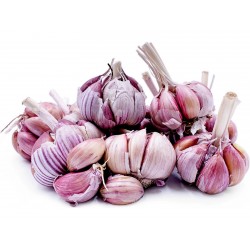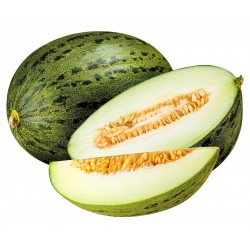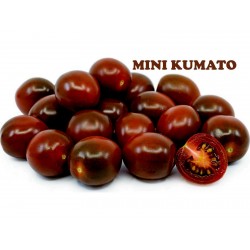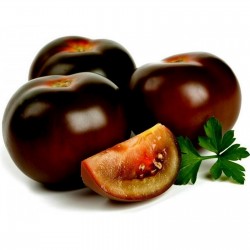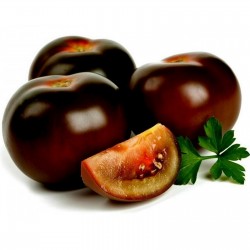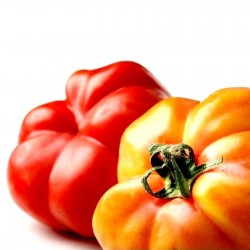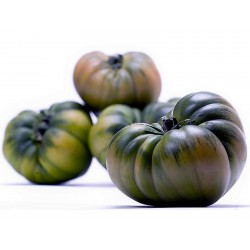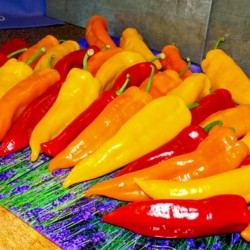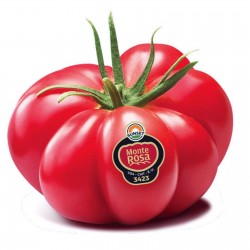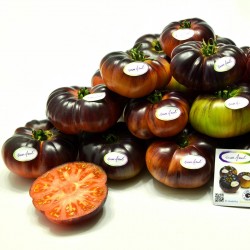Seeds Gallery Com,
5/
5
<h2><strong>Largo de Reus sweet bell pepper Seeds</strong></h2>
<h2><span style="color: #ff0000;"><strong>Price for Package of 10 seeds.</strong></span></h2>
<p>Largo de Reus from Spain is a huge sweet bell pepper from Spain. The aromatic, red pods can reach lengths up to 20 cm.</p>
<p>The variety generates vigorous plants 50/60 cm high, with abundant foliage bright green in color, and bearing numerous fruits, the fruits are compact thick-walled, and juicy.</p>
<p>They are ideal as raw food in the salad, for roasting, stewing, grilling, and stuffing. The plants are prolific and support is recommended…</p>
<hr />
<h3><i><b>About Capsicum annuum</b></i></h3>
<p><i><b>Capsicum annuum</b></i><span> is a species of the plant genus </span><i>Capsicum</i><span> (chillies or peppers and capsicums or bell peppers) native to southern </span>North America<span> and northern </span>South America<span>.</span><sup id="cite_ref-GRIN_1-1" class="reference">[1]</sup><sup id="cite_ref-4" class="reference">[4]</sup><span> This species is the most common and extensively cultivated of the five domesticated capsicums. The species encompasses a wide variety of shapes and sizes of peppers, both mild and hot, such as </span>bell peppers<span>, </span>jalapeños<span>, </span>New Mexico chile<span>, and </span>cayenne peppers<span>. Cultivars descended from the wild American bird pepper are still found in warmer regions of the Americas.</span><sup id="cite_ref-5" class="reference">[5]</sup><span> In the past, some woody forms of this species have been called </span><i>C. frutescens</i><span>, but the features that were used to distinguish those forms appear in many populations of </span><i>C. annuum</i><span> and are not consistently recognizable features in </span><i>C. frutescens</i><span> species.</span></p>
<h2><span class="mw-headline" id="Characteristics">Characteristics</span></h2>
<p>Although the species name<span> </span><i>annuum</i><span> </span>means “annual” (from the<span> </span>Latin<span> </span><i>annus</i><span> </span>"year"), the plant is not an<span> </span>annual<span> </span>but is frost tender.<sup id="cite_ref-rhs_7-0" class="reference">[7]</sup><span> </span>In the absence of winter frosts it can survive several seasons and grow into a large, shrubby<span> </span>perennial<span> </span>herb.<sup id="cite_ref-SpicePages_8-0" class="reference">[8]</sup><span> </span>The single flowers are an off-white (sometimes purplish) color while the stem is densely branched and up to 60 cm (24 in) tall. The fruit are<span> </span>berries<span> </span>that may be green, yellow, orange or red when ripe.<sup id="cite_ref-Development2006_9-0" class="reference">[9]</sup><span> </span>While the species can tolerate most frost-free climates,<span> </span><i>C. annuum</i><span> </span>is especially productive in warm and dry climates.<sup class="noprint Inline-Template Template-Fact">[<i><span title="This claim needs references to reliable sources. (December 2017)">citation needed</span></i>]</sup></p>
<h2><span class="mw-headline" id="Pollination">Pollination</span></h2>
<p>While generally self-pollinating, insect visitation is known to increase the fruit size and speed of ripening, as well as to ensure symmetrical development. Pepper flowers have nectaries at the base of the corolla, which helps to attract pollinators. The<span> </span>anthers<span> </span>do not release pollen except via<span> </span>buzz pollination, such as provided by<span> </span>bumble bees.<sup id="cite_ref-10" class="reference">[10]</sup></p>
<h2><span class="mw-headline" id="Uses">Uses</span></h2>
<h3><span class="mw-headline" id="Culinary">Culinary</span></h3>
<div class="thumb tright">
<div class="thumbinner"><img alt="Largo de Reus sweet bell pepper Seeds" src="https://upload.wikimedia.org/wikipedia/commons/thumb/b/ba/Five-Peppers-Colors-1.jpg/220px-Five-Peppers-Colors-1.jpg" decoding="async" width="220" height="98" class="thumbimage" srcset="//upload.wikimedia.org/wikipedia/commons/thumb/b/ba/Five-Peppers-Colors-1.jpg/330px-Five-Peppers-Colors-1.jpg 1.5x, //upload.wikimedia.org/wikipedia/commons/thumb/b/ba/Five-Peppers-Colors-1.jpg/440px-Five-Peppers-Colors-1.jpg 2x" data-file-width="3280" data-file-height="1456" title="Largo de Reus sweet bell pepper Seeds" />
<div class="thumbcaption">
<div class="magnify"></div>
Five colors of peppers in an Israeli supermarket</div>
</div>
</div>
<p>The species is a source of popular sweet peppers and hot chilis with numerous varieties cultivated all around the world, and is the source of popular spices such as<span> </span>cayenne,<span> </span>chili, and<span> </span>paprika<span> </span>powders.</p>
<p>Common naming in English falls generally in line with the flavor and size of the variant. Larger, sweeter variants are called "capsicums" in Australia and New Zealand and red or green peppers,<sup id="cite_ref-11" class="reference">[11]</sup><span> </span>or<span> </span>"bell peppers"<span> </span>in the United States and Great Britain.<sup id="cite_ref-12" class="reference">[12]</sup><sup id="cite_ref-morrisons_13-0" class="reference">[13]</sup><span> </span>The smaller, hotter varieties are called chillis,<sup id="cite_ref-14" class="reference">[14]</sup><span> </span>chilies, chile, or chili peppers, or in parts of the US, "peppers".</p>
<p>Capsinoid<span> </span>chemicals provide the distinctive tastes in<span> </span><i>C. annuum</i><span> </span>variants. In particular,<span> </span>capsaicin<span> </span>creates a burning sensation ("hotness"), which in extreme cases can last for several hours after ingestion. A measurement called the<span> </span>Scoville scale<span> </span>has been created to describe the hotness of peppers and other foods.</p>
<h3><span class="mw-headline" id="Traditional_medicine">Traditional medicine</span></h3>
<p>Hot peppers are used in<span> </span>traditional medicine<span> </span>as well as food in<span> </span>Africa.<sup id="cite_ref-prota_15-0" class="reference">[15]</sup><span> </span>English botanist<span> </span>John Lindley<span> </span>described<span> </span><i>C. annuum</i><span> </span>in his 1838<span> </span><i>Flora Medica</i><span> </span>thus:<sup id="cite_ref-16" class="reference">[16]</sup></p>
<blockquote class="templatequote">
<p>It is employed in medicine, in combination with<span> </span><i>Cinchona</i><span> </span>in intermittent and lethargic affections, and also in atonic<span> </span>gout,<span> </span>dyspepsia<span> </span>accompanied by<span> </span>flatulence,<span> </span>tympanitis,<span> </span>paralysis<span> </span>etc. Its most valuable application appears however to be in<span> </span><i>cynanche maligna</i><span> </span>(acute<span> </span>diphtheria) and<span> </span><i>scarlatina maligna</i><span> </span>(malignant<span> </span>Scarlet fever, used either as a<span> </span>gargle<span> </span>or administered internally.)</p>
</blockquote>
<p>In<span> </span>Ayurveda,<span> </span><i>C. annuum</i><span> </span>is classified as follows:</p>
<ul>
<li><i>Guna</i><span> </span>(properties) –<span> </span><i>ruksha</i><span> </span>(dry),<span> </span><i>laghu</i><span> </span>(light) and<span> </span><i>tikshna</i><span> </span>(sharp)</li>
<li><i>Rasa</i><span> </span>(taste) –<span> </span><i>katu</i><span> </span>(pungent)</li>
<li><i>Virya</i><span> </span>(potency) –<span> </span><i>ushna</i><span> </span>(hot)</li>
</ul>
<h3><span class="mw-headline" id="Ornamental">Ornamental</span></h3>
<p>Some cultivars grown specifically for their aesthetic value include the<span> </span>U.S. National Arboretum's<span> </span>'Black Pearl'<sup id="cite_ref-17" class="reference">[17]</sup><span> </span>and the 'Bolivian Rainbow'. Ornamental varieties tend to have unusually colored fruit and foliage with colors such as black and purple being notable. All are edible, and most (like 'Royal Black') are hot.</p>
<h2><span class="mw-headline" id="Host_plant">Host plant</span></h2>
<p>The potato tuber moth (<i>Phthorimaea operculella</i>) is an oligophagous insect that prefers to feed on plants of the family Solanaceae such as pepper plants. Female<span> </span><i>P. operculella</i><span> </span>use the leaves to lay their eggs and the hatched larvae will eat away at the mesophyll of the leaf.</p>
P 43 (10 S)

